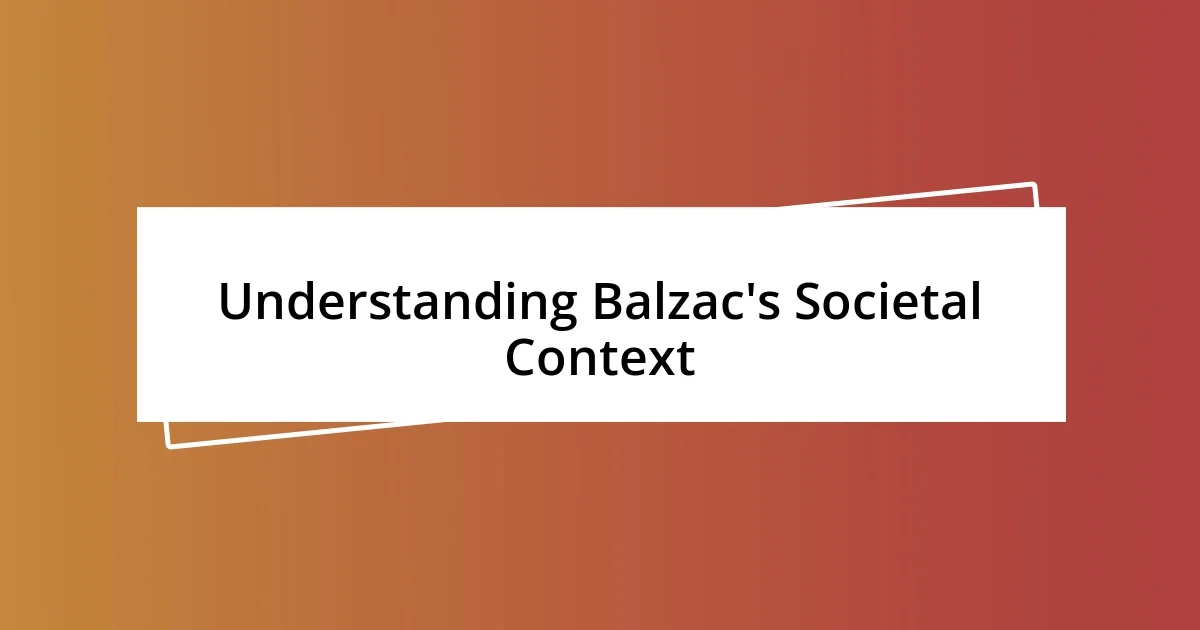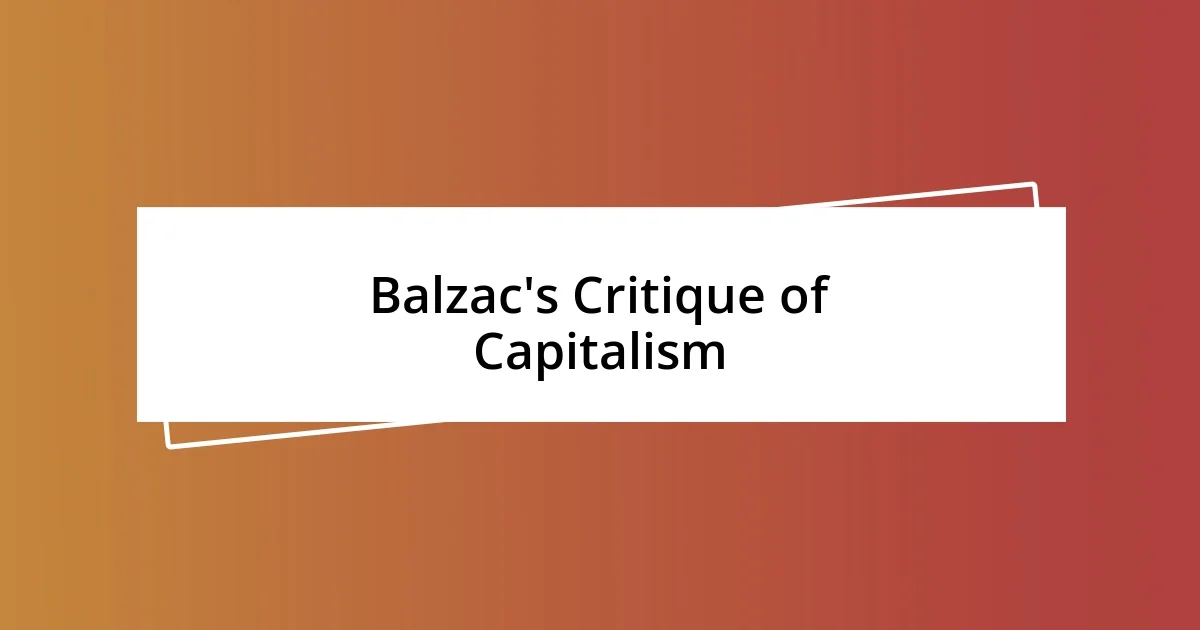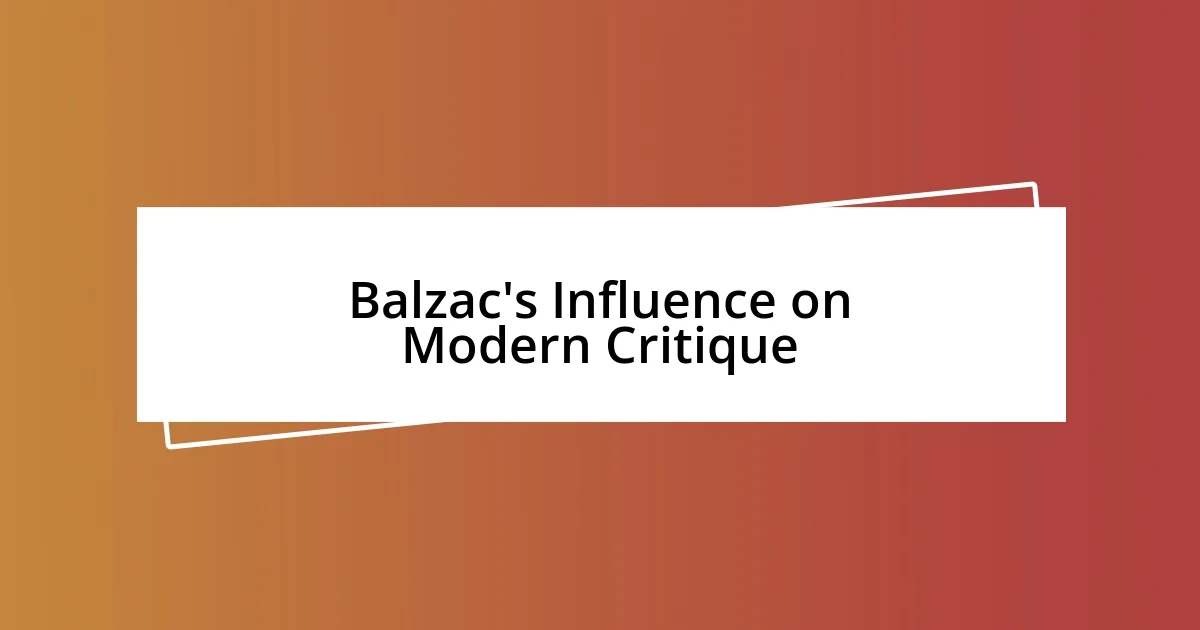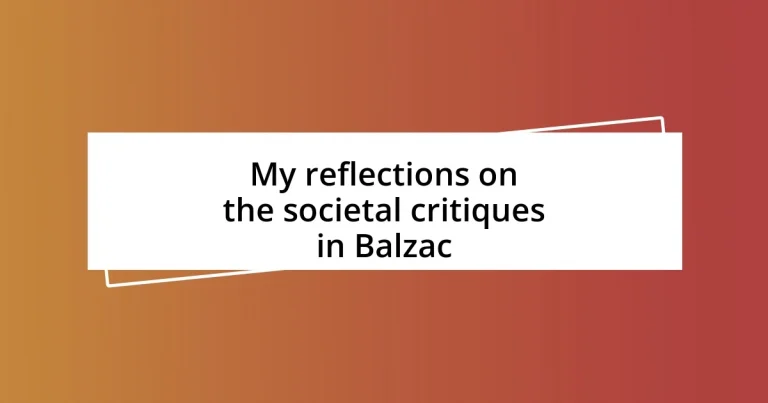Key takeaways:
- Balzac’s works reflect early 19th-century France’s class struggles and economic changes, offering insights into the tensions between ambition and morality.
- His critique of capitalism highlights moral compromises made in the pursuit of wealth, portraying the loneliness associated with material success.
- Balzac’s exploration of social hierarchies and human interactions remains relevant today, challenging readers to examine their values and relationships with ambition and materialism.

Understanding Balzac’s Societal Context
Understanding Balzac’s societal context requires a close look at the tumultuous period of the early 19th century in France. The aftermath of the French Revolution left a society grappling with the complexities of class struggles and economic change. I often think about how the sharp divides between the wealthy bourgeoisie and the struggling lower classes must have influenced Balzac’s vivid character creation.
Navigating the intersection of ambition and morality, Balzac brilliantly captured the era’s raw energy. Isn’t it fascinating how the pursuit of wealth often corrupted the very ideals of human connection? I remember reading “Eugénie Grandet” and feeling a deep sense of tension between the characters’ yearnings and their circumstances. It made me question how ambition shapes our values in today’s world.
The rise of industrialization brought both opportunity and despair, which Balzac reflected in his portraits of contemporary society. I can’t help but connect these struggles to our current issues—such as the economic divide we often see today. What does it mean for our society to chase material success? In Balzac’s time, this pursuit often heralded loneliness and moral decay, a notion that resonates even now.

Balzac’s Critique of Capitalism
Balzac’s critique of capitalism is strikingly evident in his narratives, where he vividly illustrates the moral compromises individuals make in their relentless pursuit of wealth. I often recall the scene in “Lost Illusions”—it’s so unsettling watching Lucien’s transformation as he navigates the cutthroat world of printing and publishing. His experiences made me reflect on how, even today, the desire for success can lead us to sacrifice our values and relationships, echoing the pitfalls that Balzac so keenly observed.
- He highlights the social hierarchy established by wealth, portraying the bourgeoisie as often greedy and morally bankrupt.
- Characters like Rastignac epitomize ambition but also embody the struggles against ethical dilemmas.
- The recurring theme of loneliness in the midst of riches serves as a poignant reminder that material gain doesn’t guarantee happiness.
- Balzac’s detailed descriptions of lavish lifestyles starkly contrast with the struggles of the lower classes, illustrating the widening gap between different societal segments.
This layered critique urges readers to ponder the true cost of their ambitions and societal aspirations, something I find incredibly relevant in today’s capitalist landscape.

Balzac’s Influence on Modern Critique
Balzac’s influence on modern critique is evident as his sharp observations of society compel us to empathize with the human condition. I remember nearly gasping while analyzing “The Human Comedy”; it felt like Balzac was holding a mirror to today’s social dilemmas. How often do we find ourselves judging others based solely on their financial status? It’s a reflection that pushes us to reconsider our perceptions of worth in our current, competitive society.
His portrayal of the intermingling ambitions and moral conflicts resonate profoundly with contemporary critics. I once attended a seminar where we discussed Balzac’s characters—not only as fictional beings but as representations of societal archetypes. I felt a surge of recognition when I realized that Balzac’s Rastignac still walks among us, embodying the dazzling allure and perilous pitfalls of modern ambition. Is ambition an inherently noble pursuit, or does it corrupt? Balzac seemed to suggest the latter, raising questions that echo through time.
Moreover, his deep examination of class structures underscores the complexities of human interactions, which I find incredibly poignant. My discussions with friends about societal inequities often lead back to Balzac’s themes, revealing how his critiques of the bourgeoisie and their values parallel the world we navigate today. Isn’t it captivating to think that Balzac’s insights can still stir our consciousness? His work invites us to explore our own relationships with success, materialism, and morality, making his critiques as relevant now as they were in his time.














